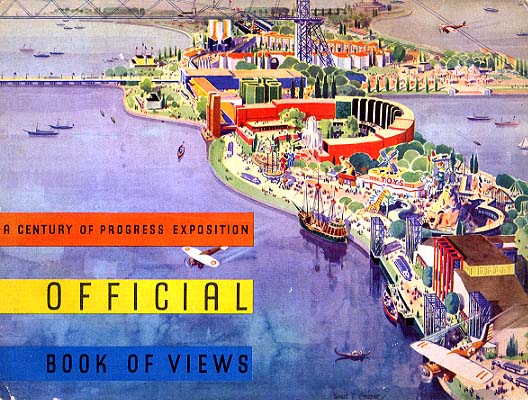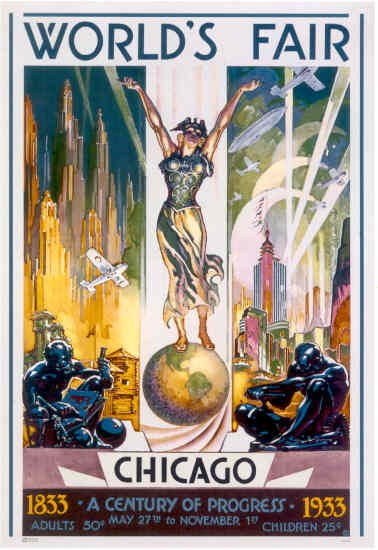June 1: Freethought and Progress
Chicago World's Fair (1933): Churches vs. Progress
It was on this date, June 1, 1933, that a World's Fair celebrating A Century of Progress opened on the lakefront in Chicago, Illinois, on Northerly Island – today known as Meig's Field. The Fair celebrated the centennial of Chicago's founding as well as 100 years of technological innovation, and it proved so popular that, after closing on November 1, it re-opened the next year (1934) from May 26 through October 31. In spite of commencing during the Great Depression, in two years the Fair attracted 48,769,227 visitors.
But just what is progress? The very idea of progress is a novelty of the 18th century Enlightenment and the Atheists who wrote the French Encyclopedia. If we ask which is more favorable to progress – religion or skepticism – the answer should seem obvious: religion is, by its nature, backward-looking.
But if we focus on those things about which religion professes to care – social and sexual morality, marriage and family, peace, temperance, crime, medicine, philanthropy, and (in some liberal religions) social and economic justice — the answer is far from obvious. That is, unless you know the facts of history, rather than just the claims of the churches.
Those who deny that humanity is better today, in every respect, than in the Middle Ages, or even in the century celebrated at the 1933 World's Fair, fail to point out a significant time against which to contrast the modern situation. In Latin it's called the terminus a quo (the earlier age) versus the terminus ad quem (the present day).
The social aspects are easiest to dispense with: humankind has progressed in the last century with dramatic decreases in crime, including sexual crime, political corruption, death-by-childbirth, and the subjugation of women and racial and religious minorities – while vastly increasing literacy and general education, average life expectancy, disease control, sanitation, transportation, freedom of opinion and discussion, and the real wage workers. Social services and civil rights organizations unknown in the 1800s blossomed in the 1900s.
 And if you reach back into the century celebrated at the 1933 World's Fair, you would have to include the abolition of slavery, the germ theory of disease, the use of anesthetics, the theory of evolution, the eight-hour day and the resurgence of unions among the progress for humanity that churches either opposed or ignored. For the most part, the churches were indifferent to this progress; often they used the secular powers to advance their superstition-based obstruction of progress.
And if you reach back into the century celebrated at the 1933 World's Fair, you would have to include the abolition of slavery, the germ theory of disease, the use of anesthetics, the theory of evolution, the eight-hour day and the resurgence of unions among the progress for humanity that churches either opposed or ignored. For the most part, the churches were indifferent to this progress; often they used the secular powers to advance their superstition-based obstruction of progress.
As historian Joseph McCabe writes, "... the chief stimulus to social progress is the friendly contact and interchange of ideas between ... different cultures or opinions. Since religion always aims at securing uniformity by, wherever possible, stifling freedom of discussion, it weakens the springs of progress."*
What about human progress? It is a fact that anti-social behavior is much more common in predominantly church-going countries – such as the two most interested in acknowledging the Christian God in the European Union Constitution, Spain and Poland – than in predominantly secular countries, such as Britain, Germany and France. As for the US, the rates for murder and other crimes are "off the scale" when compared to other Western democracies. And most US citizens at least claim to go to church!
Islamic fundamentalism has not gone through its own period of enlightenment, so this untamed religion shows best that where there is religious uniformity, there is poor social progress and little human happiness. With the exception of officially secular Turkey, countries with a 75% or more Muslim population** are the most politically repressive, and least economically, scientifically and socially progressive, on earth. It was the same when everyone was herded to church in Christian Europe.
So while everyone at the 1933 Chicago World's Fair was celebrating a century of progress, they should also have been celebrating the foundations of that progress: freethinking and religious skepticism!
* Joseph McCabe, A Rationalist Encyclopedia, article "Social Progress," 1948.
** According to the CIA World Factbook, these are the percentages of the population claimed for Islam: Afghanistan (99%), Algeria (99%), Azerbaijan (94%), Bahrain (100%), Bangladesh (83%), Comoros (98%), Djibouti (94%), Egypt (94%), Gambia (90%), Guinea (85%), Indonesia (88%), Iran (99%), Iraq (97%), Jordan (92%), Kuwait (85%), Kyrgyzstan (75%), Libya (97%), Maldives (100%), Mail (90%), Mauritania (100%), Morocco (99%), Niger (80%), Oman (85%), Pakistan (97%), Qatar (95%), Saudi Arabia (100%), Senegal (94%), Somalia (100%), Syria (90%), Tajikistan (90%), Tunisia (98%), Turkey (99%), Turkmenistan (89%), UAR (96%), Uzbekistan (88%), Western Sahara (100%), Yemen (100%).
Originally published June 2003 by Ronald Bruce Meyer.


